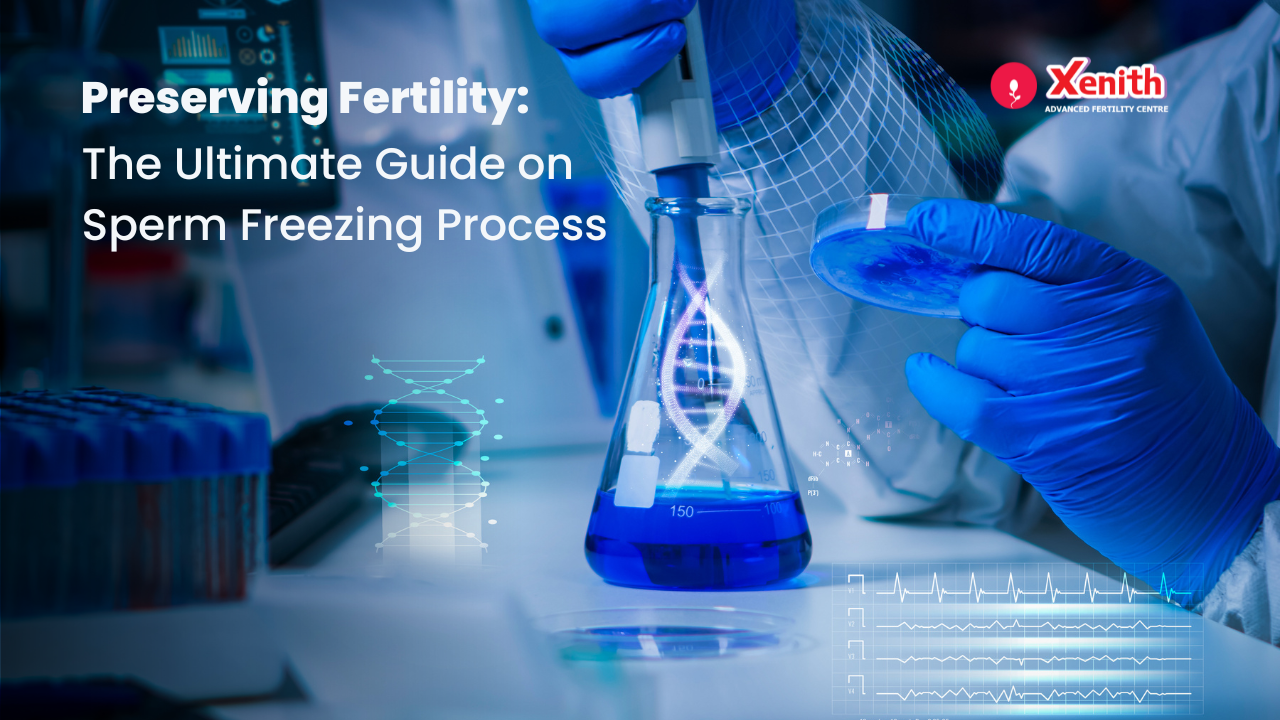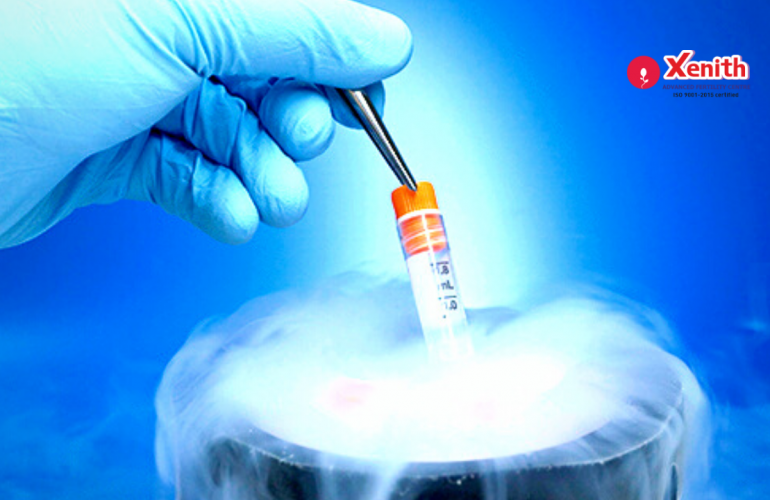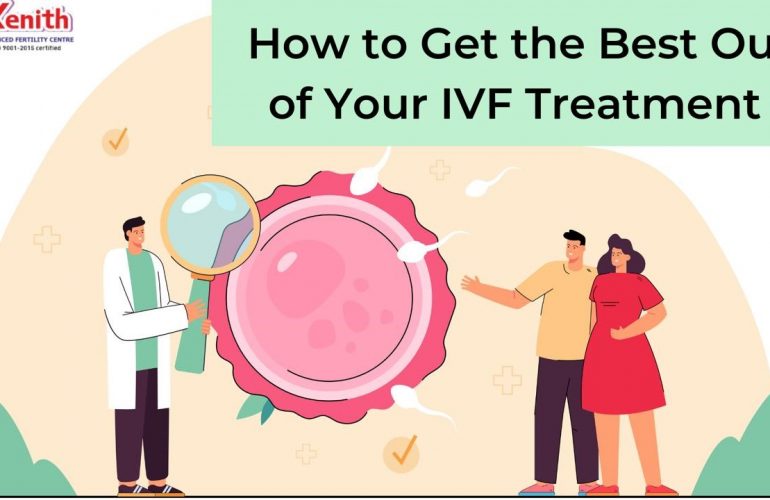A sperm is a male reproductive cell that combines with the egg which is the female reproductive cell to form an embryo that develops into a baby. Sometimes, for various reasons discussed below, there is a need to preserve the sperm. Sperm freezing or cryopreservation is the process of collecting, freezing and storing the sperm for use at a later time. All biological activity of the sperm is paused upon freezing at extremely low temperatures. There is very minimal damage to the sperm using cryopreservation.
Why would people freeze their sperm
People freeze their sperm for many different reasons. Some of these reasons include:
- Age- in men, the quality and the quantity of sperm declines over age. There is an increase in birth defects and other long term health issues for the baby with an increase in the fathers age. Since sperm of younger men is healthier than that of older men, a person wanting to have children later in life might want to look at freezing their sperm when they are younger.
- Cancer treatments– like chemotherapy as well as radiation could be detrimental to fertility. It’s important to have a discussion with your doctor about the effects of your future cancer treatment on your fertility if you wish to have kids later. So, freezing and storing your sperm would be recommended before the treatment to preserve your fertility.
- High risk jobs- sometimes exposes you to dangerous chemicals, radiation or other possible dangerous situations. Some of these jobs might include being in the military, an Xray technician, working with pesticides or construction jobs. In order to preserve your fertility in case something unforeseen happens, it’s good to freeze your sperm beforehand.
- Posthumous sperm retrieval-where sperm could be removed and frozen after that person has passed away. It is optimal to retrieve the sperm within 24 to 36 hours after death. It would be useful to have this written in a will beforehand so that a family member could have access to it. All legalities need to be in place prior to this.
- Being a sperm donor- if you would like to help other couples who wish to have kids.
- If you need to have certain surgeries or medical procedures done- like correcting undescended testicles, gender reassignment, removal of one or both testicles. Sometimes, men might undergo a vasectomy where the sperm supply is cut off from the semen only to realize later that they would like to have children. Also, people who have low sperm counts or who are going through in vitro fertilization (IVF) or going through hormone replacement therapy might benefit from having their sperm frozen.
Sperm freezing process step by step
- The person first has to fill out a form detailing medical history, sign a semen storage agreement and is tested for any disorders, infectious or sexually transmitted disease through a simple blood test.
- Semen samples must be provided into a vessel provided by the lab and no lubricants or saliva can be used to ejaculate the semen because it could contaminate the sample. Abstain from sex 2 to 3 days before providing a sample. Sometimes surgery might be needed to get a sperm sample directly from the testicles due to various reasons like vasectomy, low sperm or no sperm in semen, or cancer. This sample must be given to the lab right away or within a few hours after collection.
- The sperm is washed and separated from the seminal fluid and other contaminants. A small sample is tested for presence of sperm and its quality/quantity to make sure the sperm is healthy and enough sperm are present to undergo freezing. If there isn’t enough sperm, you might need to undergo more testing to find the reason for ways to improve your fertility.
- Some cryoprotectants, which protect the sperm from damage due to ice formation and preserve it well, are added to the sperm sample and transferred to a few vials which are labelled and catalogued, and frozen in liquid nitrogen at -196oC in various freezers so that if there is an issue with one of the freezers, the other samples are still safe. Frozen sperm could last a very long time if it’s frozen and stored properly and it’s been known to survive for more than 20 years. Sperm could be frozen and stored in a fertility clinic or in a sperm bank.
- A small sample will be thawed after it is frozen to check the viability and health of the sperm and also see how many sperm will survive this freezing procedure. Based on these results, they can determine how many samples will be needed for successful pregnancy and also what type of treatment option might be recommended. Treatment options could be intrauterine insemination (IUI) or in vitro fertilization (IVF) where a woman’s egg and the thawed sperm are introduced together in a laboratory setting for fertilization to occur and this fertilized embryo is transferred back to the woman’s uterus for implantation and pregnancy to occur or IVF combined with intracytoplasmic sperm injection(ICSI) where one sperm is injected directly into the egg for fertilization and then transferred back to the woman’s uterus for implantation.
- When the sperm is needed, the sperm sample is verified with the patient’s paperwork and it is carefully thawed and then analysed to see if the sperm are still viable and healthy for use. It has to be thawed slowly in an orderly way to prevent cell damage and then the cryoprotectants are removed from the sperm so that it is then ready for use in IUI, IVF or IVF with ICSI.
The cost of freezing the sperm could vary from clinic to clinic. There is also the additional cost of keeping the sperm frozen in storage for a period of time. Make sure that you provide all your relevant information like your contact details in case they move or if there is an issue with the company. Also, if you are moving to a different address or your phone number is changing, please make sure that these details are communicated with the company that is storing your sperm. The dedicated experts at Xenith Advanced Fertility Centre can answer any questions you might have about freezing your sperm if you are interested in this procedure. So, feel free to book a consultation with our team.




